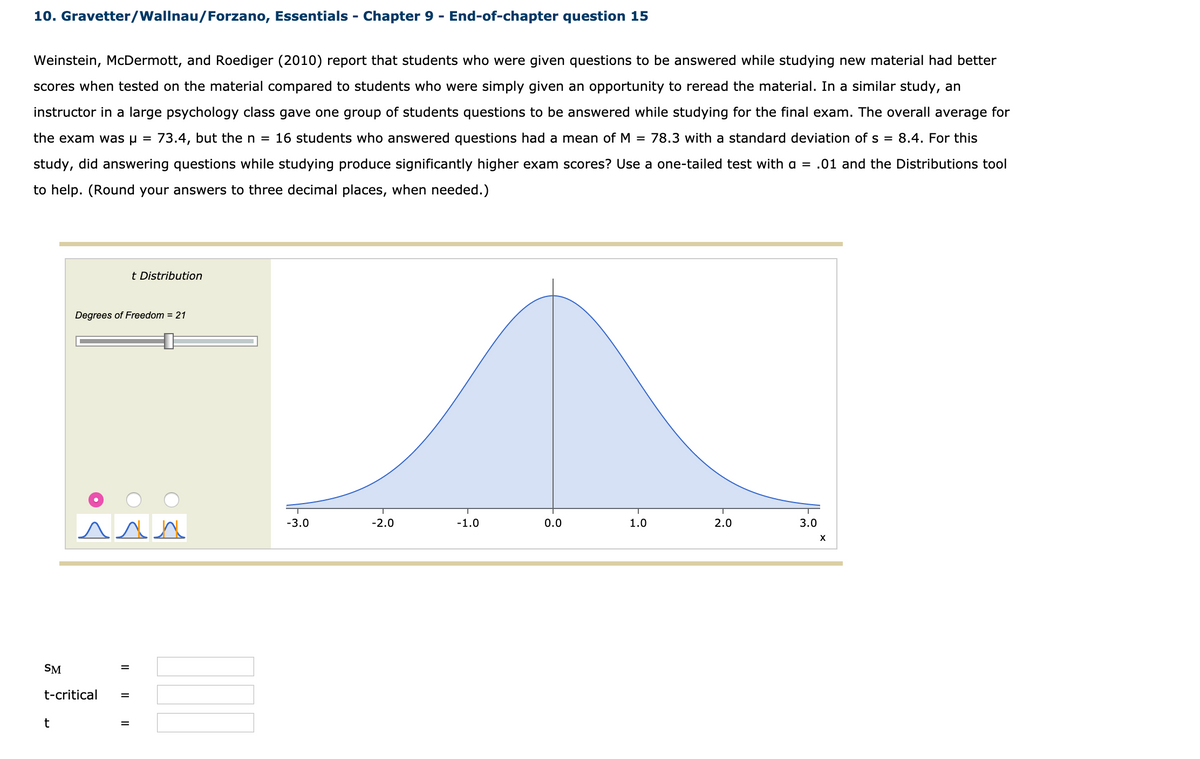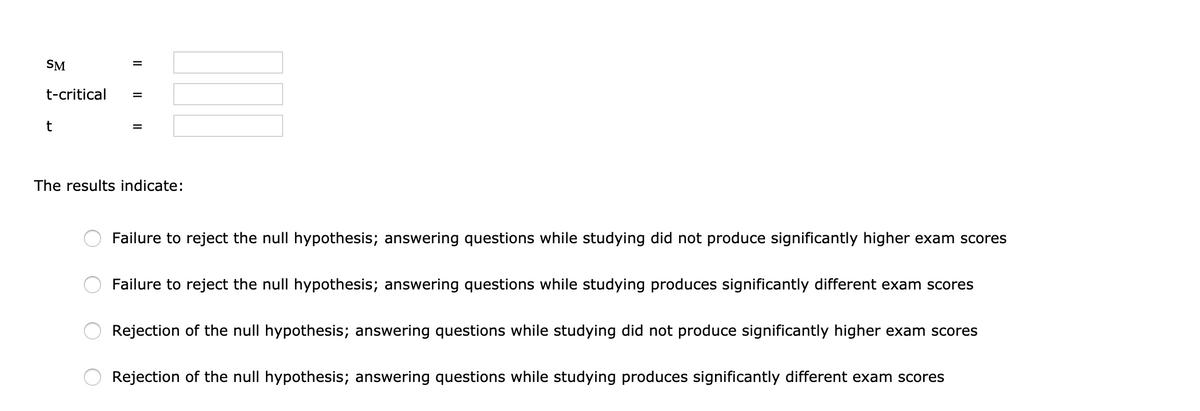Weinstein, McDermott, and Roediger (2010) report that students who were given questions to be answered while studying new material had better scores when tested on the material compared to students who were simply given an opportunity to reread the material. In a similar study, an instructor in a large psychology class gave one group of students questions to be answered while studying for the final exam. The overall average for the exam was u = 73.4, but the n = 16 students who answered questions had a mean of M = 78.3 with a standard deviation of s = 8.4. For this study, did answering questions while studying produce significantly higher exam scores? Use a one-tailed test with a = .01 and the Distributions tool to help. (Round your answers to three decimal places, when needed.)
Weinstein, McDermott, and Roediger (2010) report that students who were given questions to be answered while studying new material had better scores when tested on the material compared to students who were simply given an opportunity to reread the material. In a similar study, an instructor in a large psychology class gave one group of students questions to be answered while studying for the final exam. The overall average for the exam was u = 73.4, but the n = 16 students who answered questions had a mean of M = 78.3 with a standard deviation of s = 8.4. For this study, did answering questions while studying produce significantly higher exam scores? Use a one-tailed test with a = .01 and the Distributions tool to help. (Round your answers to three decimal places, when needed.)
Glencoe Algebra 1, Student Edition, 9780079039897, 0079039898, 2018
18th Edition
ISBN:9780079039897
Author:Carter
Publisher:Carter
Chapter10: Statistics
Section: Chapter Questions
Problem 13PT
Related questions
Topic Video
Question

Transcribed Image Text:10. Gravetter/Wallnau/Forzano, Essentials - Chapter 9 - End-of-chapter question 15
Weinstein, McDermott, and Roediger (2010) report that students who were given questions to be answered while studying new material had better
scores when tested on the material compared to students who were simply given an opportunity to reread the material. In a similar study, an
instructor in a large psychology class gave one group of students questions to be answered while studying for the final exam. The overall average for
the exam was u =
73.4, but the n = 16 students who answered questions had a mean of M = 78.3 with a standard deviation of s = 8.4. For this
study, did answering questions while studying produce significantly higher exam scores? Use a one-tailed test with a = .01 and the Distributions tool
to help. (Round your answers to three decimal places, when needed.)
t Distribution
Degrees of Freedom = 21
-3.0
-2.0
-1.0
0.0
1.0
2.0
3.0
SM
%3D
t-critical
%3D

Transcribed Image Text:SM
%D
t-critical
t
The results indicate:
Failure to reject the null hypothesis; answering questions while studying did not produce significantly higher exam scores
Failure to reject the null hypothesis; answering questions while studying produces significantly different exam scores
Rejection of the null hypothesis; answering questions while studying did not produce significantly higher exam scores
Rejection of the null hypothesis; answering questions while studying produces significantly different exam scores
Expert Solution
This question has been solved!
Explore an expertly crafted, step-by-step solution for a thorough understanding of key concepts.
This is a popular solution!
Trending now
This is a popular solution!
Step by step
Solved in 3 steps

Knowledge Booster
Learn more about
Need a deep-dive on the concept behind this application? Look no further. Learn more about this topic, statistics and related others by exploring similar questions and additional content below.Recommended textbooks for you

Glencoe Algebra 1, Student Edition, 9780079039897…
Algebra
ISBN:
9780079039897
Author:
Carter
Publisher:
McGraw Hill

Glencoe Algebra 1, Student Edition, 9780079039897…
Algebra
ISBN:
9780079039897
Author:
Carter
Publisher:
McGraw Hill